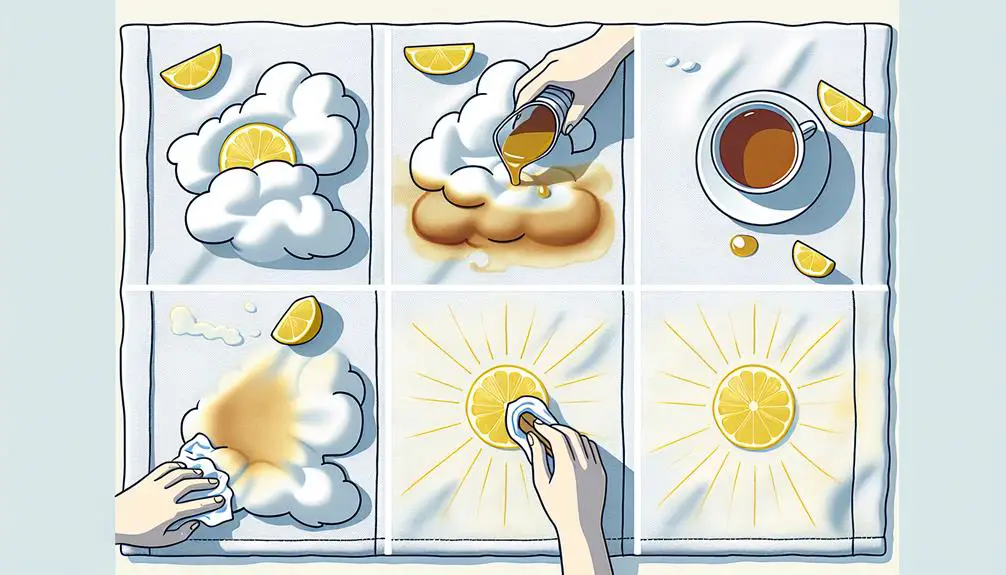Brighten your tea-stained teeth with simple DIY techniques: Try oil pulling with coconut or sesame oil to detox, then spit out. Mix baking soda with lemon juice or charcoal powder for a scrub, but use sparingly. Swish hydrogen peroxide diluted with water for 30-60 seconds, then rinse. Create a turmeric paste with water or coconut oil and gently brush onto teeth for 3-5 minutes. Consider swishing apple cider vinegar mixed with water for a minute, but use sparingly. These natural methods offer a brighter smile. Enhance your knowledge on brightening teeth further.
Key Points
- Oil pulling with coconut or sesame oil removes tea stains effectively.
- Baking soda scrub with lemon juice or charcoal whitens tea-stained teeth.
- Hydrogen peroxide rinse helps whiten teeth but should be used moderately.
- Turmeric paste enhances whitening and removes tea stains gently.
- Apple cider vinegar rinse, when used sparingly, brightens tea-stained teeth.
Oil Pulling
To effectively practice oil pulling, begin by swishing a tablespoon of coconut or sesame oil in your mouth for about 15-20 minutes each morning before brushing your teeth. This Ayurvedic practice not only improves oral hygiene but also serves as a natural mouthwash. The coconut oil detox properties help remove toxins and bacteria from your mouth, promoting fresher breath and healthier gums.
During oil pulling, the oil mixes with your saliva and turns into a white, milky liquid. This transformation is believed to be an indication that the process is working effectively. The oil works by pulling out impurities and bacteria from your mouth, which you can then spit out once the time is up. Remember not to swallow the oil as it contains the extracted toxins from your mouth.
Incorporating oil pulling into your daily routine can be a beneficial addition to your oral care regimen, offering a natural and holistic approach to maintaining oral health.
Baking Soda Scrub
For optimal teeth whitening results, consider integrating a Baking Soda Scrub into your oral care routine. Baking soda, also known as sodium bicarbonate, is a common household ingredient that can help eliminate surface stains on teeth effectively. Here's how to make the most of this natural remedy:
- Lemon Juice Remedy: Mix a small amount of lemon juice with baking soda to create a paste. Lemon juice's acidity combined with the abrasiveness of baking soda can help whiten teeth, but use this mixture sparingly as the acid can wear down tooth enamel over time.
- Dental Flossing: Before using the baking soda scrub, make sure you have flossed your teeth to remove any food particles or plaque. This step allows the baking soda to work more effectively on the stains without interference from debris.
- Charcoal Powder: For an added whitening boost, consider combining a small amount of activated charcoal powder with baking soda. Charcoal is known for its ability to absorb impurities and can help lift tough stains from the teeth.
- Fluoride Toothpaste: After using the baking soda scrub, brush your teeth with fluoride toothpaste to strengthen enamel and protect against cavities. This step ensures a thorough oral care routine for maintaining a bright smile.
Hydrogen Peroxide Rinse
Consider integrating a hydrogen peroxide rinse into your oral care routine to enhance teeth whitening results effectively. Hydrogen peroxide is a common ingredient in tooth whitening products due to its ability to remove stains and brighten teeth.
To create a hydrogen peroxide rinse at home, mix equal parts of 3% hydrogen peroxide solution with water. Swish this solution around your mouth for about 30 seconds to 1 minute, making sure not to swallow any of it. Spit out the rinse and rinse your mouth thoroughly with water.
Hydrogen peroxide works by breaking down the compounds that cause stains on your teeth, leading to a brighter smile over time. It's essential to use this rinse in moderation as excessive use can lead to tooth sensitivity and irritation of the gums.
Integrating this rinse into your mouth hygiene routine once or twice a week can help maintain your teeth's whiteness while promoting good oral health. Remember to consult with your dentist before starting any new tooth whitening methods to ensure they're suitable for you.
Turmeric Paste
Enhance your teeth whitening regimen with the natural remedy of turmeric paste, known for its potential to brighten and whiten teeth effectively. Turmeric, a spice commonly used in cooking, contains curcumin, which has anti-inflammatory and antimicrobial properties beneficial for oral health.
Markdown list:
- Preparation: Create a paste by mixing turmeric powder with water or coconut oil until it forms a thick consistency.
- Application: Gently brush the turmeric paste onto your teeth using a soft toothbrush or your finger.
- Duration: Allow the paste to sit on your teeth for about 3-5 minutes to maximize its whitening effects.
- Rinse: Thoroughly rinse your mouth and brush your teeth with regular toothpaste to remove any remaining turmeric residue.
Using natural remedies like turmeric paste can provide a gentle yet effective way to improve the brightness of your smile while supporting your overall oral health. Remember to use this technique consistently to see the best results in combating tea-stained teeth.
Apple Cider Vinegar Rinse
To effectively brighten your teeth and improve oral hygiene, incorporate an Apple Cider Vinegar Rinse into your daily routine. Apple cider vinegar (ACV) is known for its natural teeth-whitening properties and antibacterial benefits. To create the rinse, mix one part ACV with two parts water. Swish this solution around your mouth for about one minute, ensuring it reaches all areas of your teeth. However, due to its acidic nature, it's crucial to use this rinse sparingly to avoid damaging your tooth enamel.
In addition to its teeth-whitening effects, ACV can also help combat bad breath and remove stains caused by tea and coffee consumption. For those seeking a more potent remedy, you can add a few drops of lemon juice to the rinse. This lemon juice remedy can further enhance the whitening effects of the ACV.
While using the ACV rinse, it's important to maintain good oral hygiene practices such as brushing with toothpaste options that promote whitening, such as those containing baking soda or hydrogen peroxide. Remember, consistency is key to achieving and maintaining a brighter smile.
Frequently Asked Questions
Can These DIY Techniques Be Used on Dental Work Such as Crowns or Fillings?
When considering dental work like crowns or fillings, it's important to understand the limitations of DIY options. While some techniques may be safe, others can harm dental work. Consult your dentist for safe and effective alternatives.
Is It Safe to Use These Methods if You Have Sensitive Teeth or Gums?
If you have sensitive teeth or gums, using natural remedies for whitening may not be the best choice. Some methods can exacerbate sensitivity. Consulting a dentist is essential to guarantee both gum safety and whitening efficacy.
How Often Should These Techniques Be Used to See Noticeable Results?
For noticeable results, use these techniques regularly but not excessively. Consistent use is key for long-term effectiveness. Remember, moderation is important for avoiding enamel damage. Maintain good oral hygiene practices alongside these methods to maximize their benefits.
Are There Any Potential Side Effects or Risks Associated With Using These Natural Remedies?
As you explore natural remedies for teeth whitening, be cautious about potential long-term effects and health risks. Prioritize precautions to safeguard your oral health. Educate yourself on the risks and take proactive measures.
Can These Techniques Be Used as a Substitute for Professional Dental Cleanings or Whitening Treatments?
Using DIY techniques to brighten tea-stained teeth can enhance your smile, but professional cleanings and whitening treatments are essential for long-term oral health. DIY methods may help maintain results, but professional care is irreplaceable.



